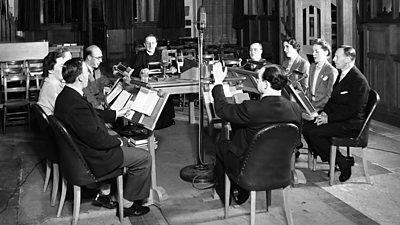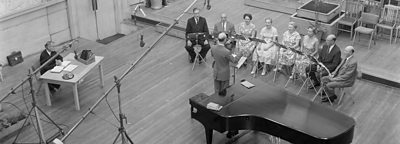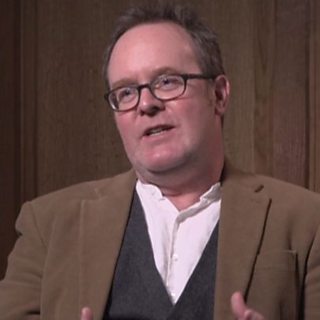'We are living in a Christian land' declared one of the founding figures of the ΒιΆΉΤΌΕΔ when it was launched in 1922. Even at the time, Britain was home to a wide range of beliefs and traditions - both Christian and non-Christian. It is a range that has been expanding ever since. So what might newly-released oral history archives tell us about how the ΒιΆΉΤΌΕΔ of the 1920s evolved over the years to embrace the reality of religious diversity?

When it comes to matters of belief, finding a message or a voice that appeals to everyone - or even one that simply avoids offence - is hard enough. But, as this dip into the ΒιΆΉΤΌΕΔ Oral History Collection reveals, religious broadcasting has had to navigate a myriad of other tensions.
It is worth starting not at the beginning of this story but somewhere close to the end - some twenty years after the arrival of Windrush. And here, one of our surest retrospective guides is Colin Morris, a former Methodist missionary in Africa who joined the Corporationβs Religious Broadcasting department in 1977 and stayed there for another nine years, mostly as overall Head. The mid-1970s turned out to be a crucial moment in the departmentβs history, a period when the Christian churchesβ tight grip over the national airwaves was tested properly for the first time.
Morrisβs earlier experience in what had been called "Northern Rhodesia", and his profound distaste for the racial inequality he had witnessed there, would make him a lifelong advocate for inclusivity. But inclusivity was caught up with two bigger issues which Religious Broadcasting had been grappling with for years.
First, there was the still unresolved question of religious broadcastingβs essential purpose. Was it, for instance, all about worship - simply providing a church service of the air? Or was it a place to explore the very nature of religious belief? Might it even be a means of applying a spiritual or moral perspective to contemporary debates?
Perhaps it was about all of these, but if so, what was the right mix?
Secondly, there was the question of where the ΒιΆΉΤΌΕΔβs Religious department positioned itself on the broad spectrum of belief. What, for instance, constituted the religious "mainstream"? And what should the balance be in terms of resources and airtime between this mainstream - if it existed - and any "minority" traditions? This wasnβt just a matter of the relationship between different religions, it also concerned the balance between different churches or factions within each religion.
Lurking beneath every question was another, yet more profound. What actually came first in any of the religious broadcastersβ calculations - religion or broadcasting?
As Morris recalls in this 1993 interview, dealing with such knotty philosophical questions frequently involved answering rather more practical questions over matters such as "Outside Broadcasts" β or "OBs", to use ΒιΆΉΤΌΕΔ jargon. It also involved immense amounts of diplomacy:
Morrisβs description of the topics covered by Religious Broadcasting in the 1970s offers a stark contrast to the approach taken back in the 1920s and β30s. The nature of ΒιΆΉΤΌΕΔ policy between the wars has been described elegantly by Eric Fenn, who was appointed Assistant Director of Religious Broadcasting in 1939.
In his interview for the ΒιΆΉΤΌΕΔβs Oral History Collection, Fenn recalls the pioneering days of the Reverend Frederic Iremonger and the creation of the so-called "Central Religious Advisory Committee" - or "CRAC" - a powerful committee of the Great and Good which kept its beady eyes on the programme-makers from afar.
Whatβs most striking in his account, however, is what it reveals about the unquestioned alignment of ΒιΆΉΤΌΕΔ religious broadcasting with the Christian churches:
We can sense in Fennβs interview the tentative beginnings of a broader approach - a form of religious broadcasting which might one day have relevance beyond the devoted minority of Anglican or Catholic worshippers. It was only really after the Second World War, however, that we can see this take practical form.
The ΒιΆΉΤΌΕΔβs Head of Religious Broadcasting in the late-1950s, Roy McKay, aimed, as he put it, to "make the whole thing a bit more astringent" - to offer "Christian insight into social and political questions". It was an approach that coincided with a less deferential, more probing style in TV current affairs, and was no doubt influenced by this prevailing trend.
Despite this, when the ΒιΆΉΤΌΕΔ was required to give an account of itself to the government-appointed Pilkington Committee in the early-1960s, the implications of Britainβs growing cultural diversity barely registered.
As Colin Morris recalled in his oral history interview, the official position still appeared to be that "Religious Broadcasting was Christian and that therefore it was concerned with proclaiming the gospel".
Only a decade and a half later, however, we find the ΒιΆΉΤΌΕΔ offering a very different definition to the Annan Committee. Morris recounts his role, on the eve of his appointment to the ΒιΆΉΤΌΕΔ, as a member of CRAC - the Central Religious Advisory Committee at this crucial moment:
Despite all the opposition and foot-dragging from more conservative forces, 1977 stands out in retrospect as a significant year in the story of religious broadcasting. It was then that the Annan Committee made its recommendations and called for Britain to have a more diverse broadcasting landscape. It was then, too, that Colin Morris, an individual evidently alive to inequality, first took a leading role in ΒιΆΉΤΌΕΔ religious broadcasting.
Yet in broadcasting, and perhaps especially in the case of the ΒιΆΉΤΌΕΔ, evolution is more evident than revolution. And, for Morris, there remained a strong sense of unfinished business at the end of his tenure. In particular, he suggests, religious broadcasting never quite managed to escape from the shadow of "organised" religion, with its boundaries and its rituals, so that it might begin to examine the human condition at an even more fundamental philosophical level:

